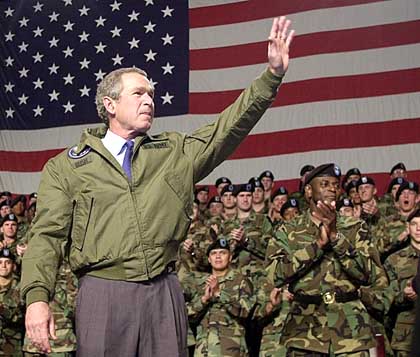
What would a Democratic victory mean in 2008? It"s worth considering one additional point (as if you needed more), that isn"t often made, at least not explicitly. For a long time, as much as Arabs and Muslims hated our foreign policy, they would still, for the most part, make a distinction between Americans and American policies (former, good; latter, bad). It wasn"t as bad in the 1990s as it is now, but let"s not pretend that the Muslim world liked our policies then either. But at least, then, they didn"t see us as an unfettered force for evil and destruction (no, I"m not exaggerating. As unfair as that may be, that"s actually how people view us in the Bush era). It was difficult to hate us - the American people - because Bill Clinton, as the elected representative of Americans, wasn"t exactly the kind of guy that easily inspired hatred in foreign lands. Strangely enough, Clinton, today, is one of the more beloved figures on the much-remarked upon "Arab street." I"m pretty sure that every time I"ve mentioned his name in Egypt, I"ve gotten big, beaming smiles. "Clintuuuuuuun!" Indeed.
However, beginning in 2004, the distinction between Americans and the American government began to blur. People throughout the world (and not just in the Middle East) began asking an obvious question. Americans had four years of Bush, and yet they voted for him again, knowing full well what he stood for. How could this be? They wondered. If Americans are so good, how did they elect someone so evidently bad? I never had an answer for this, partly because I didn"t know the answer, and partly because I think I only actually knew one person who voted for Bush. So, I would plead innocence: "It wasn"t me!" That and a sheepish smile would usually do the trick (public diplomacy in action!) Anyway, the anger once reserved primarily for the American "government" or American "policy" began to morph into full-on anti-Americanism. At least that"s how I began to see it in my travels in the region. I saw it in the accusatory comments from my relatives and friends. The denunciations of American policy once usually included a disclaimer (of course, we like Americans, but...). After 2004, I was hearing the disclaimer much less often. This shouldn"t have been a surprise. Contrary to popular perceptions, Arabs and Muslims know how democracy works: A majority goes to the polls and votes for who it prefers. It follows logically then, that if Bush got elected, a majority of Americans voted for him (50.73% to be exact).
If there is one thing a Democratic victory will do, it will send a very targeted message to those who have begun to wonder whether Americans are on their side, or on the side of blatant aggression and warmongering. It will say: "We have now officially repudiated the last eight years of foreign policy, and we are asking you to give us another chance to show that our country, America, can become what we wish it to be once again - a force for good in international affairs. We have wreaked havoc on the world, but, through the power of democracy, we have seen our faults and acknowledged them. And so we have decided to correct our errors and change course. We will show you something different. This is a new era for not only America but for the world. At the same time, as much as we will change, we will not be - we cannot be - perfect. You will again find fault with us. But, now, with a Democratic president and a Democratic congress, we are moving forward. We want the America of the 21st century to stand on the side of peace, progress, and development. We will begin moving, slowly but surely, in that direction, renewed by a new sense of humility and purpose."